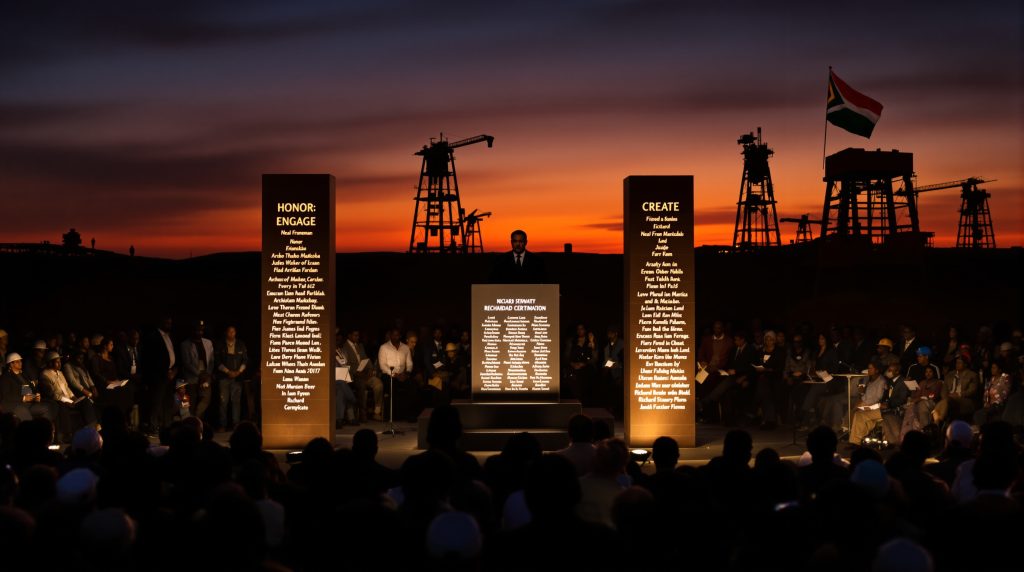Neal Froneman's Final Marikana Address: A Legacy of Renewal and Reconciliation
August 2025 marked a significant moment for both Sibanye-Stillwater and the South African mining industry as Neal Froneman delivered his final Marikana address before retirement. The sixth Annual Marikana Commemoration Lecture represented not just the culmination of Froneman's leadership journey, but also highlighted the ongoing efforts to heal wounds and transform relationships within the mining industry evolution following one of its darkest chapters.
The Historical Weight of Marikana
The Marikana tragedy of August 2012 stands as a watershed moment in South Africa's post-apartheid history. What began as a labor dispute escalated into a violent confrontation resulting in the deaths of 34 miners, 10 other individuals, and leaving dozens injured. The event sent shockwaves through South African society and prompted soul-searching about labor relations, policing, and corporate responsibility in the mining sector.
When Sibanye-Stillwater acquired Lonmin in June 2019, they inherited not just mining assets but also the responsibility for addressing the complex legacy of Marikana. Froneman, who founded and led the Group since 2013, embraced this challenge as a core part of his leadership mission.
"Marikana is not just a place," Froneman stated in his farewell address. "It is a symbol of what is possible when we lead with heart, humility, and hope."
The Evolution of the Marikana Renewal Programme
Following the acquisition of Lonmin in 2019, Sibanye-Stillwater initiated the Marikana Renewal Programme in 2020. This initiative wasn't merely a corporate social responsibility project but a comprehensive framework designed to facilitate healing, transformation, and sustainable development.
The programme operates under three guiding principles:
- Honor: Remembering those who lost their lives and supporting their families
- Engage: Creating meaningful dialogue with all stakeholders
- Create: Developing sustainable opportunities for affected communities
The Annual Marikana Commemoration Lecture has become a cornerstone of this renewal effort, providing "a platform for dialogue, reflection and learning" that brings together diverse stakeholders from across South African society.
While specific metrics about the programme's impact remain limited in public reporting, the consistent commitment to maintaining this dialogue over six years demonstrates an understanding that healing from such trauma requires sustained effort rather than quick fixes.
Advocate Geoff Budlender's Powerful Insights
The sixth commemoration lecture featured Advocate Geoff Budlender SC, who served as senior evidence leader at the Marikana Commission of Inquiry. His perspective carries particular weight given his intimate knowledge of the events and their underlying causes.
Budlender's lecture focused on what he identified as the most disturbing aspect of the tragedy: the profound alienation experienced by the miners. "What shocked me most was not only the killings themselves, but the level of alienation," Budlender stated. "These were people who felt so disregarded that they saw themselves effectively at war with their employer and with the police."
This alienation, according to Budlender, remains insufficiently addressed across the mining industry. He particularly highlighted the experience of rock drill operators, who perform some of the most physically demanding work in the mines often without feeling their contributions are valued or their voices heard.
His warning was stark and unambiguous: "If you have people living on your property and working for you, and they are in that state of hostility, it should give you grave cause for reflection. Unless there are avenues for anger and frustration to be heard and addressed, violence becomes the language of last resort."
Leadership Transition and Continuing Commitment
As Froneman prepares to step down after founding and leading Sibanye-Stillwater since 2013, incoming CEO Richard Stewart has affirmed the company's ongoing commitment to the Marikana Renewal Programme. This transition represents a critical juncture for the initiative, testing whether the commitment to renewal transcends individual leadership.
Stewart's comments suggest a recognition that the principles established must continue: "The Marikana Renewal Programme has valuable lessons for the entire mining sector and the country at large. A meaningful dialogue must recognise the injustices of the past — and acknowledge the role we have all played."
Stewart's Vision for Industry Transformation
In his remarks, Stewart demonstrated an understanding of the historical context that shapes current mining labor relations. "Our industry was built on the back of desperate migrant labour, which devastated families and communities. While we have made progress, we still bear those scars," he acknowledged.
This historical awareness informs Stewart's approach to community engagement, moving beyond traditional corporate social responsibility models: "Communities are not passive beneficiaries — they are essential partners in ensuring that the value we create outlives the life of the mine."
Froneman's Reflections on Progress
In his final address, Froneman reflected on the journey since acquiring Lonmin in 2019. "We faced the legacy of the tragedy head-on," he stated. "We honoured promises made to the widows and their families, supported their children through education, and co-created new opportunities for renewal and transformation."
While specific metrics were not detailed in Froneman's speech, he emphasized the importance of fulfilling commitments to the families affected by the tragedy, particularly through educational support for children who lost parents.
The transition from Froneman to Stewart represents not just a change in leadership but a test of institutional commitment to the renewal principles that have been established. Stewart's explicit commitment to continue this work suggests the programme will remain a priority under new leadership.
Broader Lessons for the Mining Industry
Advocate Budlender's lecture highlighted that the lessons of Marikana extend far beyond a single company or incident. His warning that "such alienation should serve as a wake-up call for all mining companies" points to systemic issues that require industry-wide attention.
Several key lessons emerge from the Marikana experience:
- Worker alienation as a warning sign: When employees feel fundamentally disregarded, the foundations for conflict are established
- Communication failures: The absence of effective channels for grievances can escalate disputes beyond resolution
- Historical context matters: Mining companies must recognize and address the historical injustices that shape current relationships
- Sustainable engagement: Community relationships require ongoing investment rather than transactional approaches
Budlender emphasized the connection between addressing these issues and the future viability of mining in South Africa: "It is only if we address these matters that our mining industry will be able to thrive — to the lasting benefit of those who work in the mines, those who own them, and our country."
Stakeholder Collaboration in the Healing Process
The Marikana Renewal Programme demonstrates the importance of bringing diverse perspectives to the healing process. Archbishop Thabo Makgoba serves as Patron of the programme, bringing moral authority and a reconciliation perspective to the initiative.
Judge Ian Farlam, who chaired the Marikana Commission of Inquiry, continues to engage with the renewal process. Both Makgoba and Farlam "emphasised the need for sustained effort, dialogue and collaboration in honouring the legacy of Marikana and driving long-term industry and societal renewal."
This multi-stakeholder approach acknowledges that healing from such a profound tragedy requires perspectives beyond corporate leadership. Religious leaders, legal experts, community representatives, and labor organizations all bring necessary perspectives to the renewal process.
Future Prospects for Marikana and Mining
Richard Stewart's affirmation of "the Group's continued commitment to the Marikana Renewal Programme and broader industry transformation" suggests that the work begun under Froneman will continue. However, the true measure of success will be in the lived experience of workers and community members in the years ahead.
Several key questions will determine the long-term impact of the renewal efforts:
- Will communication channels between management and workers remain open and effective?
- How will community development initiatives translate into sustainable economic opportunities?
- Can the lessons from Marikana inform practices at other mining operations?
- Will industry-wide labor relations show evidence of transformation?
As Stewart noted, "The legacy of Marikana, built on Honour, Engage and Create, must continue to guide us. We've made meaningful strides, but we must now look ahead to how we build on these lessons."
Understanding the Marikana Renewal Journey: Key Questions
What specific actions has Sibanye-Stillwater taken since acquiring Lonmin?
Since the 2019 acquisition, Sibanye-Stillwater established the formal Marikana Renewal Programme in 2020, built around the principles of Honor, Engage, and Create. The company has maintained the Annual Marikana Commemoration Lecture as a platform for ongoing dialogue and reflection, bringing together diverse stakeholders to address the complex legacy of the tragedy.
How are the families of those affected by the tragedy being supported?
According to Froneman's final address, the company has "honoured promises made to the widows and their families, supported their children through education, and co-created new opportunities for renewal and transformation." Educational support for children appears to be a particular focus of these efforts, though detailed metrics on this support are not publicly available.
What measures are being implemented to prevent similar tragedies?
The emphasis on addressing worker alienation and improving communication channels represents the primary preventative approach. By creating avenues for grievances to be heard and addressed before they escalate, the company aims to prevent the conditions that contributed to the original tragedy.
How is the company addressing the underlying issues highlighted by Budlender?
Budlender identified deep worker alienation as a fundamental cause of the tragedy. The Renewal Programme's focus on engagement and dialogue appears designed to address this root cause, though measuring changes in worker sentiment would require detailed internal assessments not available in public reporting.
What role do stakeholders play in the ongoing renewal process?
The involvement of Archbishop Thabo Makgoba as Patron and the continued engagement of Judge Ian Farlam demonstrates the multi-stakeholder approach to renewal. These figures from outside the corporate structure bring important perspectives on reconciliation and justice to the process.
Disclaimer: This article presents analysis based on public statements and available information. The long-term impact of the Marikana Renewal Programme will depend on continued implementation of commitments and the development of measurable outcomes. Readers should consider multiple perspectives when evaluating corporate social responsibility initiatives.
The Path Forward
Neal Froneman's final Marikana address represents both a conclusion to his leadership chapter and a continuation of the renewal journey. The true test of this initiative will be its sustainability beyond individual leadership, its expansion beyond a single company to industry-wide practices, and most importantly, its tangible impact on the lives of those affected by the tragedy.
As mining companies navigate South Africa's complex socio-economic landscape, the lessons of Marikana offer both a warning and a blueprint for more equitable, sustainable relationships between mining operations and the communities they impact.
The mining industry's future in South Africa may well depend on how thoroughly these lessons are learned and applied, not just at Marikana but across operations throughout the country. As Budlender pointedly noted, addressing these fundamental issues is essential not just for ethical reasons but for the industry's own survival and prosperity.
The implementation of proper mental health strategies for workers and addressing the ongoing women in mining challenges are two crucial aspects that will determine whether the South Africa beneficiation insights from Marikana can translate into lasting mining leadership trends that benefit all stakeholders.
Want to Be the First to Know About Major Mineral Discoveries?
Stay ahead of the market with Discovery Alert's proprietary Discovery IQ model, which provides instant notifications on significant ASX mineral discoveries, turning complex data into actionable investment insights. Visit the Discovery Alert discoveries page to understand how early identification of major mineral finds like Marikana could transform your investment portfolio.




